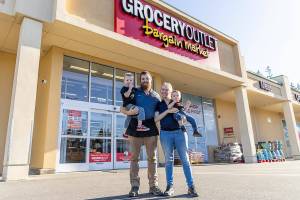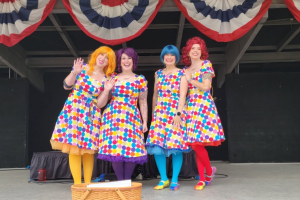Too pretty to eat
Published 3:45 pm Tuesday, September 25, 2007
The Marshland Produce Market doesn’t exactly feel like a produce stand.
In fact, it’s more like a temple for local vegetable worship.
On the outside, it looks like nothing more than a big red barn flanked by a fall harvest of pumpkins and corn stalks.
Inside, however, it’s positively cathedralesque.
Ceilings with exposed rafters soar nearly two stories high. Light pours through extra-large high windows. On the floor, more than 2,800 square feet of retail space invite exploration with case after case of fresh, mostly local produce.
If local food is indeed experiencing a rebirth, then this is one of the biggest revival tents of all.
What’s in season?
Everything, it seems.
But be sure to pick up some winter squash, a fruit of the earth so beautiful it seems almost wrong to eat it.
But then you remember all that can be done – golden butternut squash soups spiced to perfection; baked, hot-from-the-oven acorn squash sprinkled with sugar and topped with butter; perfectly cute sweet dumplings that can be stuffed with savory delicacies of the season, whatever you crave.
Soon you’ll find winter squash in abundance at farms and produce stands such as Marshland Produce Market, where a colorful, head-spinning cornucopia already awaits, including orange-red hubbards, evergreen acorns, elongated stripettis, nearly black starships and, the most stunning of all, carnival squashes with splashes of cream, green and orange.
That’s not to mention the many colorful pumpkins and ornamental gourds for sale, great for decoration and fall harvest celebrations.
Marshland produce market manager Jessica Stecher, 21, likes all the winter squashes, but she’s a particular fan of the hubbards.
“They’re really cool,” Stecher said. “They’re really great for casseroles. You chop them up into little blocks.”
Stecher also likes the sugary taste of the sweet dumplings and acorns, too.
“Acorn squash is a nuttier squash,” Stecher said. “It’s got a yellow-orangish blush.”
Stecher, who sometimes helps pick winter squash in addition to coordinating the market goods, said the plants are fairly easy to grow.
They get their name because they store far longer and better than softer-skinned summer squashes such as zucchini.
There are other fruits and vegetables to check out here, too, including some big surprises such as deep-red fresh local strawberries and a rainbow of hothouse peppers — red, yellow, green, purple and white bells, neon-orange habaneros and shiny green jalapenos and Aneheims.
All of them, as most signs here say, are “Maltby grown.”
Sitting on 80 acres, including 60 acres dedicated to apples, pears and other fruit, the Marshland Produce Market in rural Snohomish is in its second year as a seasonal produce stand.
It’s a relatively new enterprise for owners John and Marijke Postema, who founded Flower World, a nursery in Maltby, in 1968.
The Dutch-born couple’s newest market is one of three produce venues they’ve added to their operations in recent years including a smaller but no-less-lush Maltby Produce Market kitty-corner from the plant mecca of Flower World.
Earlier this month, they opened what they hope will be the first of many mobile RedRoof Produce stands. Their prototype is currently parked near the corner of 35th Avenue and Maltby Road five days a week. Customers can walk into a door at one end and then out a door at the other with local produce in hand.
“It’s very visible. It is a new concept. The idea is to start several of those,” said Marijke Postema, 65. “We’ll see how it works.”
John Postema, 66, hopes to see the RedRoof stands someday in gas-station parking lots as a way to bring the produce to the people.
“We put it out there on a busy intersection,” he said. “We figure that if people do not want go too far out of their way to get their fresh things, it’s like going to a fast-food store. You just get your gas or your milk.”
Postema believes there are two keys to successful produce sales.
“Appearance is half of it and the taste is the other half,” he said, adding that he won’t grow heirloom tomatoes, also known as “ugli ripes,” in their many hothouses. “Heirloom tomatoes are really interesting tomatoes and they taste great. But when you put them on display, nobody buys them.”
Greenhouses, meanwhile, have been the key to one of Postema’s greatest innovations — fresh local strawberries available not just for three weeks a year, but steadily from June through October.
While most local strawberry growers plant exclusively June-bearing strawberries for a big, early summer crop, Postema has recently invested in the Tristar variety, which yields a small, steady crop throughout the growing season, further extended by greenhouse growing.
“That’s a whole new development in strawberry production,” he said. “In Europe, they’ve done this for a long time.”
Right now, because of the novelty, Postema can charge $3.49 a pint or $25 a flat.
Many people are willing to pay for that flavor, especially from a local grower.
Though the Postemas’ fruits and vegetables aren’t certified organic, Marijke Postema said they rarely use chemicals on their crops and try to practice natural farming whenever possible. When they do spray, they avoid doing so when the produce is growing.
Looking at their winter squash fields on Marsh Road, where weeds are running a pretty good late-season game against the plants, it seems impossible an herbicide has ever touched the soil.
Getting into vegetables has meant a steep learning curve for the Postemas, including their American-born daughter, Liesa Postema, 40, who works for both the nursery and produce operations.
She’s just learning about all the diversity and romance of the produce world.
“I didn’t realize how many different varieties of squash there are,” she said. “It’s so old-fashioned. It brings back memories of fall and winter and Thanksgiving.”
Liesa Postema said her father is quite a character, a man who likes to get things done.
He is president of the Snohomish County Farm Bureau and has been a staunch advocate for farmland preservation and a supporter of the hugely controversial I-933 “property rights” initiative that failed last November.
Between their produce and ornamental plant operations, the Postemas own about 200 acres, primarily in the Maltby-Snohomish area. They also own about 200 acres of citrus orchards in development in Belize, which may one day supply their local markets.
“I think John’s concept is he can do anything,” Liesa Postema said. “He’s a great entrepreneur. I think what happened is he got bored with plants.”
Her mother, who worked for the airline industry in Europe, is particularly business-minded.
“He just loves to grow the veggies,” Marijke Postema said of her husband, who recently planted grapes for a future winery near Maltby. “He doesn’t care if he sells it or not. That’s where I come in.”
Reporter Sarah Jackson: 425-339-3037 or sjackson@heraldnet.com




